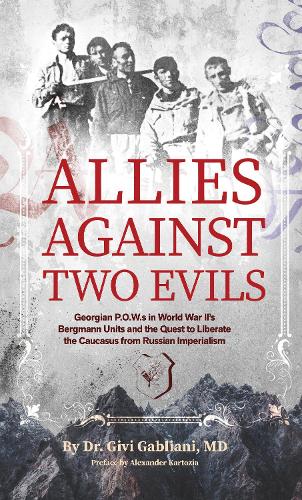
Allies Against Two Evils: World War II, The Bergmann Unit's Georgian POWs and the Quest to Liberate the Caucasus from Russian Imperialism
(Paperback)
Available Formats
Publishing Details
Allies Against Two Evils: World War II, The Bergmann Unit's Georgian POWs and the Quest to Liberate the Caucasus from Russian Imperialism
By (Author) Givi Gabliani
Introduction by Alexander Kartozia
Preface by Hans von Herwarth
DoppelHouse Press
DoppelHouse Press
22nd November 2023
United States
Classifications
General
Non Fiction
Autobiography: historical, political and military
Second World War
940.5412
Physical Properties
Paperback
400
Width 152mm, Height 228mm, Spine 25mm
Description
An eye-witness account of the Russian/European conflict at the heart of WWII, relevant today as war rages again along similar battle lines in Ukraine, Crimea and the Caucasus.
Dr. Givi Gabliani, a Georgian exile from a noble family living in the United States since the 1950s, recounts his conscription into the Red Army as a young man shortly after his father was killed in Stalin's purges, and his coordinated efforts in the "Bergmann" Unit. These mountain troops, uniquely composed of fellow POWs from the Caucasus, fought against Stalins forces on the Eastern Front in Ukraine and Crimea.Their goal: to liberate their homelands. Gabliani finds unlikely allies among a group of German officers in the German Resistance, some later executed after their failed plot to assassinate Hitler, who promise to support Georgian Independence.
Gabliani envisions a future Europe supporting a trans-Caucasian alliance with mixed races and religions living together equally in tolerance and prosperous harmony, as they had for millennia in Georgia. As a spokesman for the POWs, he coordinates with the Georgian exile government in occupied Paris and Berlin, finding a secret effort afoot in occupied France to save Georgian and other Eastern European Jews.
With a new Introduction by Georgian-German scholar Alexander Kartozia, Gabliani's war memoir centers our attention on an active fault line. Across the great conflicts of the twentieth century that undergird and still define the region between Russia, with its imperialist ambitions, and the Black Sea, Georgia and the Georgian people appear as some of the most likely partners for international efforts toward peace.
Reviews
In 1921, the Soviets occupied Georgia by force. Givi Gabliani naturally opposed Soviet imperialistic and criminal rule. The German Resistance wanted after the overthrow of Hitler to liberate the different nations in the Soviet Union from Soviet dictatorship. Therefore, Givi Gabliani as a prisoner of war in 1941 decided to cooperate with the German Resistance. In 1942, he joined a Caucasian volunteer unit which was formed by Admiral Canaris, a leading member of the German Resistance executed in 1945.In 1943, Gabliani became a member of the Georgian liaison mission, which represented also the Georgian exile government in Paris. The Georgian liaison mission worked closely together with the German Resistance, especially with Colonel Count Stauffenberg and Ambassador von der Schulenburg, who both were the fathers of the Soviet volunteer [forces] in the German Army.The Bergmann military unit was created in 1941, composed of Georgian emigrants to the West as well as those who had stayed in their home country [and were conscripted to fight with the Red Army]. Givi Gabliani, in the frame of the Bergmann unit, and later as a member of the Georgian-National Committee had an important role in this period. His memoirs offer a rich source pertaining to German-Georgian history.
Hans von Herwarth, Former German Ambassador to Britain, January 18, 1988.
Author Bio
Dr. Givi Gabliani (19152001) was a general surgeon who practiced medicine for over 35 years in Quincy, Illinois. Gabliani came to the United States in 1950 and remained here in exiledue to the fact his father Egnate Gabliani, governor of the Svaneti mountain region, was a resistance leader and political prisoner killed in Stalin's purges in the 1930s. Gabliani wrote his memoir in the optimism of the early 1990s as the Soviet Union was collapsing, and it looks forward to a future world without a Russian oppressor in the Caucasus.
Alexander Kartozia,former Minister of Education of Georgia and director of the National Parliamentary Library,is a widely published scholar awarded with research prizes from Germany and Georgia. He received the "Order of Merit" from the Federal Republic of Germany in 2022. His research includes German-Georgian cultural exchange and Georgian culture, literature, and language.
Hans-Heinrich Herwarth von Bittenfeld, also known as Johann von Herwarth, was a German diplomat in Moscow who provided the Allies with information prior to and during the Second World War. He revealed the secret pre-war pact made between Hitler and Stalin on how to divide Central Europe and continued to advise Western powers not to give in to Hitler's territorial demands. In 1955, Herwarth became the first post-war ambassador from Germany to London.
